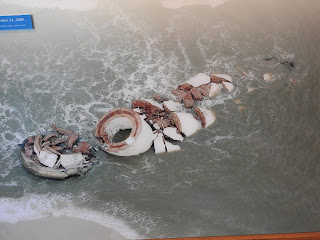First, there’s this. You know how your beer glass sweats and when
you pick it up the cocktail napkin sticks to the bottom? Salt.
I asked the bartender what in the world he was doing. Aubrey said, “You grind salt onto the napkin
before you set the glass down. Then the
napkin doesn’t stick to your glass. I
just hate that!” It works! I’ve been doing it ever since!
The road south to
Carrabelle, FL was very skinny and bumpy.
So skinny that it was difficult to stay on the pavement if a vehicle was
coming from the other way. My nerves
were shredded after a while and I turned the wheel over to Rob. I just couldn’t take any more. The road passed through miles of devastated
forests of broken trees and waves of trees that were bent over never to
recover. At last, it looked like the
forests were giving way to clearings and finally, we saw the water, the gulf
coast. Ah, home at last!
 |
| There's Noobee! |
We are parked facing the
gulf ocean. At high tide, the water is
about 10 feet from Noobee. Pelicans are
dive bombing for fish. Sandpipers and
egrets wade up and down the beach searching for snacks. Great big fish jump up out of the water. The breeze off the water is a blessing
because the humidity is oppressive, today topping off at 93%. Yes, this makes the napkin stick to the
bottom of your beer glass. No alligators
live here that I know of but Rob says to be on the lookout because, he warns, you
can only see their eyes. If I can see
their eyes, I am way too fucking close.
One of my preferred ways not to die is by being eaten by
an
alligator. Sharks are up there, too.
 |
| High tide (morning) |
 |
| Low tide (evening) |
 |
| Sir Pelican |
 |
| Little Miss Piper |
 |
| Englebert the Egret |
The buildings that survive
tropical storms and hurricanes have a narrow profile. The Crooked River Lighthouse is one such
structure. The small diameter 103 ft.
tall tower in the middle has 138 steps that one can climb to the top where it
is probably 115F. “One” is not me. Not Rob, either. The outside trusswork gives the lighthouse
stability and it stands today where it was originally built in 1895. The Cape St. George Light was not so
fortunate. Having a much larger profile
and subject to shifting foundations due to wave action, the light began to
list. It was shored up by engineers but
continued wave action at last caused the collapse of the light in 2005, 153
years after its construction. The local
volunteers salvaged every piece, cleaned each brick and reassembled the light
on more stable ground. It is a
relatively short, squatty light, 72 ft. tall.
(Some of the tallest lights in the US stand as high as 190-200 ft.)
 |
| Crooked River Light |
 |
| St George Light (then) |
 |
| St. George Light (now) |
 |
| St. George Light alist 7.5 deg. |
 |
| Ocean - 1, St. George Light - 0 |
Hurricane Michael came
ashore here on Oct. 8, 2018. It was a
Class 5 and did severe damage to the trees, shoreline, homes and villages along
this coastal region. The damage is still
evident as the locals continue to shovel out the debris and sand to rebuild. They reason that Michael was the worst storm
to hit in 27 years so they’re safe, now.
A common construction method is to build houses up on stilts. Some are concrete, some are logs. The stilts are often taller than the house
they support although some support 3-story structures. The area of the contiguous USA terra firma is
roughly 3M sq. mi. and yet, there are those who say, “Nope, I want to live in a
house on stilts as far out in the water as possible in Hurricane Land.” The stilts are meant to reduce profile and
provide stability against the ravages of violent seas and storms. Effective?
Every other house here has a “for sale” sign on it. You be the judge.
 |
House on stilts that
didn't fare so well |
 |
| Another house on stilts |
 |
House that used to be on stilts.
Stilts are to the right,
remains of the house to the left. |















Noobee is so close to the water... she needs STILTS!
ReplyDeleteYour site is stunning! Nope...I don't want to live in a house on stilts anywhere the water in hurricane land. No thank you. How are the bugs? In my mind, FL is famous for its roaches, and I always say they are big enough to put saddles on. They like to call them Palmetto bugs, but they're frigging roaches!! Ugh. And then there are the mosquitoes.
ReplyDeleteLuckily, we have not had any mosquitoes to deal with. Only biting flies and little gnats.
DeleteLest I forget...I hope you survive the humidity. Nearly kills me, and I try to avoid the south during the summer.
ReplyDeleteThe bugs are mostly these tiny little things that get through the screens. I haven't seen roaches. And no skeeters. Are we lucking out or something? The humidity is overwhelming.
Delete